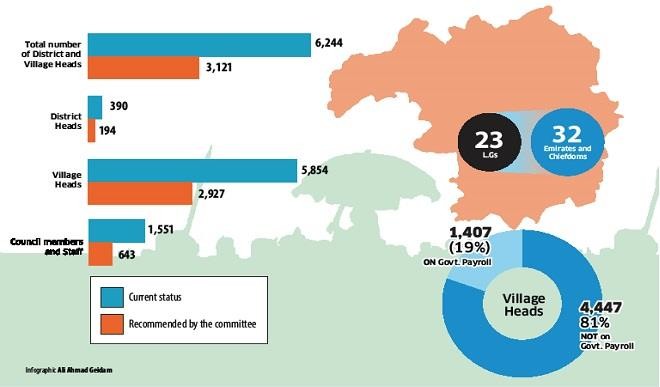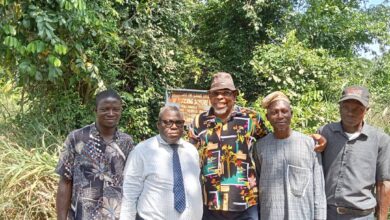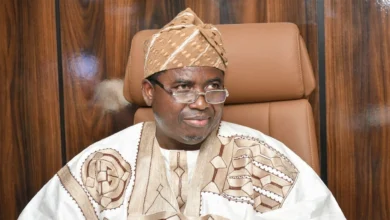3,000 District, Village Heads to go in Kaduna – Report

Over 3,121 district and village heads in Kaduna State should lose their titles and domains, a committee for restructuring of traditional institutions has recommended to the state government, Daily Trust on Sunday investigations have shown.
The recommendations are contained in a report of the committee set up by Governor Nasiru el-Rufai on “Restructuring of district and village administration in Kaduna State.”
The committee recommended the scrapping of the positions of 194 district heads, 2,927 village heads, as well as 643 council members and staff of the traditional institutions in the state.
The committee said the restructuring had become expedient because “most of the new districts were created based on political considerations,” and funding them had become “major constraints to infrastructural development at the grassroots level.”
There are presently 390 district heads, 5,854 village heads, 399 council members and 1,152 staff in the 32 emirates and chiefdoms spread across the 23 local government areas of the state.
About 4,447 of the 5,854 village heads are not on the payrolls of the local government councils, according to the committee.
Of the 32 emirates and chiefdoms,10 of them are of first class status thus: Zazzau, Birnin Gwari, and Jema’a emirates; and Kagoro, Moro’a, Jaba, Atyap, Bajju, Gwong, and Adara chiefdoms.
There are nine second class status chiefdoms: Numana, Lere, Gbagyi, Kauru, Kajuru, Kagarko, Koro, Jere, and Ninzo.
The remaining 13 chiefdoms of third class status are: Saminaka, Kumana, Godo-Godo, Kaninkon, Fantswam, Nyenkpa, Ikulu, Tsam, Kurama, Piriga, Ayu, Takad, and Anghan.
The state government may announce the restructuring this week, an insider told Daily Trust on Sunday. “Barring any last minute change, the state government will announce the new changes most likely Monday or Tuesday, next week,” the source said.
Hundreds of district and village heads have not been paid since the coming of Governor Nasiru el-Rufai administration two years ago, our reporters gathered.
The seven-member committee, chaired by the permanent secretary, Ministry for Local Government in the state, Ibrahim Sabo, submitted its report to the governor in January, 2017.
Other members of the committee are Abdullahi Sani, acting permanent secretary, Ministry of Rural and Community Development; Hassan Junaid, acting director, admin and finance, Ministry for Local Government; Sani Galadima, overseer, Chieftaincy Matters, Ministry for Local Government; and Emmanuel Ishaya Anche, principal local government officer, Ministry for Local Government, as secretary.
Mu’azu Abdul, deputy director, finance, and Murtala Haruna Yahaya, principal executive officer – all in the Ministry for Local Government, were co-opted as members of the committee.
The committee’s terms of reference are: to find out the number of districts in the emirates/chiefdoms of the state before creation of additional districts in 2001; to identify the current number of districts and justify the need for restructuring the existing ones bearing in mind the history, landmass, and population of the districts as well as the financial position of the respective local governments and; to come up with a modest and uniform structure for the district and village administration.
The committee was also mandated to produce a modest structure of the emirates and chiefdoms bearing in mind the history, size and status of the emirates/chiefdoms; to make any other recommendation(s) that will guide government to take informed decision(s) on districts and village administration; and to submit report within one week from the date of first sitting.
The report said the need for sacking of the district and village heads was informed by the fact that “the average total monthly income of local governments is grossly inadequate to cater for the average monthly expenditure of the councils.”
Other reasons given by the committee is that “the ever-increasing cost of maintaining the districts and village administration has been the major constraints to infrastructural development at the grassroots level.”
The report said that before 2001, there were only 76 districts and 1,407 village heads, adding that “the creation of most of the additional districts in the year 2001 and those created after 2001 were not based on a standard criteria, i.e historical antecedents, population and landmass but rather informed by political considerations.”
Findings show that Governor Ahmed Makarfi administration created 22 chiefdoms and dozens districts after the communal clashes that killed hundreds in the state in 2001.
Makarfi’s action was borne out of the need to solve the age-long cries of “Zazzau emirate domination” by mostly the communities in southern parts of the state.
On the staffing of the emirates and chiefdoms, the report said lack of uniformed establishment for the district administration before 2015 “gave rise to the abuses recorded in the employment carried out in some districts leading to over-bloated staffing position.”
The committee said as at December 2016, there were 272 staff in the employment of Zazzau emirate. Birnin Gwari had 61, Jema’a 42, Kagoro 61, Moro’a 26, Jaba 34, Atyap and Bajju 48 each, Gwong 43 and Adara 24.
These figures didn’t include council members, district and village heads. The staffing appointments by the oldest first class emirates and chiefdoms of Zazzau, Birnin Gwari, Jema’a, Kagoro, Moro’a and Jaba “was not guided by any laid down criteria.”
The committee said the staff were recruited based on the “long standing tradition of appointments which rested completely on the wishes of the emirate/chiefdom.”
The committee, however, admitted that the Makarfi administration “provided for the staff in a requirement in the 22 newly-created chiefdoms in the state” through a circular No.S/MLG/GEN/583/VOL.I/165, dated February 16 ,2001.
Based on the above, the report recommended the adoption of seven staff per district (including the district head) for the purposes of uniformity and control.
The committee also recommended that the staff of the district or village administration be made under the control and supervision of the Local Government Service Commission, as it is the case with unified local government staff.
When contacted, officials of the Zazzau emirate were not ready to speak on record. However, a top palace source said the emirate was ready to abide by any decision taken by the state government.
‘It is part of the ploy against us’
“What you ought to know is that right from assumption of office of this administration in Kaduna State, it clearly showed its anti-monarchs stance. Therefore, we don’t expect them to do anything that would favour us. You may wish to recall that some of our district heads and other officials are being owed salaries for months.
“We didn’t see the report you are talking about and its recommendations, but I am sure the government would call our leaders to discuss it. Until that is done, it would not be proper to speak on the report,” the source said.
When reminded about the likely benefit that the Zazzau emirate would derive if the state traditional institutions arrangement were returned to pre-2001 status, the source said there was no such gain on sight.
“Before the Governor Ahmed Mohammed Makarfi’s re-organization of traditional institutions, there were 17 local governments under the Zazzau emirate out of the 23 that we have. Makarfi removed six – Kauru, Kajuru, Zangon-Kataf, Chikun, Lere and Kagarko. We were left with 11. This new arrangement is not returning those local governments to Zazzau emirate, but it is taken us back to 23 district heads instead of the 86 that we have. So, you can see that about 63 district heads and their workers would lose their jobs.
“As I said earlier, we are not to determine what government should do. We are to take directives and instructions from them, because they are our paymasters. If you observe, we have maintained a sealed lips over the stance of the Kaduna State government on traditional institutions, because we know their position on us. However, all these people that would lose their jobs are citizens of Kaduna State,” the source said.
Investigation by Daily Trust on Sunday revealed that many prominent district heads in the Zazzau emirate may lose their districts if the state government accepts the recommendations of the committee. One of such districts that may be scrapped is Hanwa district. This district is headed by Yariman Zazzau, Alhaji Munir Jafaru.
Another district that may give way is Muchia. This is headed by Dan Barhin Zazzau, Alhaji Ahmed Bashar Aminu, who is one of the sons of Iyan Zazzau, Alhaji Bashar Aminu. Tudun Wada district under Salanken Zazzau, Dr. Bello Abdulqadir, may also have to give way.
Other districts to be affected include Gyellesu district under Dan Darman Zazzau, Alhaji Lawal Zailani; Dutsen Abba headed by Maharin Zazzau; Tukur Tukur, under the Dan Isan Zazzau, Alhaji Akilu Idris, who is now late but new district head is yet to be turbaned.
Wucicciri district is also one of the districts created after 2001 and it is headed by Alhaji Sani Sarkin Fada, Madaran Zazzau. There is also Fatika district headed by Maidalan Zazzau, Alhaji Abdullahi Ibrahim, among many others.
Further findings revealed that each district head has seven workers attached to him and the workers are on the payroll of Kaduna State. An average worker of a district is receiving a monthly salary of N25,000.
A district head that was on the throne before the 2001 restructuring told our reporter that the new policy would likely to return them to their “former place of pride,” because part of their territories and power that were taken away would be restored.
But another traditional title holder from one of the chiefdoms in the southern part of the state who spoke in confidence for fear of victimization said the policy would have “serious negative impact” on the traditional institution in the state.
He said the state government justifying the proposed restructuring with shortage of fund was not the whole truth.
“I agree that there is the issue of funding the chiefdoms and emirates. But what the traditional institutions get from the local governments where they are domiciled isn’t as the state government is portraying it.
“Let me give you an example. There are four chiefdoms in the local government where I come from. There was a month when the local government got N177 million as statutory allocation from the federal government and had over N165 million deducted by the state government.
“The four chiefdoms were allocated about N7 million from the remaining balance.”
The source added that for “a chiefdom with six district heads, the new policy is to sack five of them and retain one. What happens to the five district heads to be sacked and dozens of village heads?”
All this is happening because the state government has refused to take the advice offered by the Emir of Zazzau Shehu Idris, another source privy to the restructuring said.
“The state government summoned all the emirs and chiefs and informed them of the restructuring exercise. During the meeting, the governor said the retrenchment of the district and village heads was because of paucity of funds.
“But the emir of Zazzau told the governor that since the state is finding it difficult paying the salaries of the district and village heads, there is no need to sack them. The traditional institution will endure without salaries for now. The emir categorically pleaded with the governor to maintain the status quo so that if another administration comes on board, it will find a way out,” the source said.
A source in the Kaduna Government House who asked not to be named confirmed the state government was contemplating major restructuring of district and village administrations in the state.
He said the exercise was designed to reduce the wage burden of local governments and enable the councils to devote more of their resources to development.
“There is such a mismatch between local government revenues and their expenses that some local government councils are unable to pay their bills, especially salaries, without support from the state government. The bloated wage bills of these councils indicate that they are carrying more than they can bear,” he said.
Our reporter also learnt that the state government has discussed the need for change with the state Council of Chiefs and Emirs, and asked for their input on the issue.
“A committee has recommended to the government to revert to the 76 districts that the state had prior to 2001 when 314 additional districts were created, raising the number to 390. These new districts, with at least seven staff each, add to the burden of local government councils which were required to pay them. With many of the local governments unable to pay salaries without the support of the state government, there is a need to tackle the causes of excess,” the source said.
The source said the emirs and chiefs had deliberated on the matter and unanimously supported government’s proposals. “They are suggesting that 77 districts be retained while the head of all other districts be referred to as unpaid community leaders. Government’s final decision on these matters is awaited.”
It was also learnt that district heads in the state will be paid all their outstanding salaries and allowances immediately the new policy comes into force.
The Senior Special Assistant to the Kaduna State governor on media, Samuel Aruwan, could not be reached for comments as he did not pick several calls to his line. (Daily Trust)









